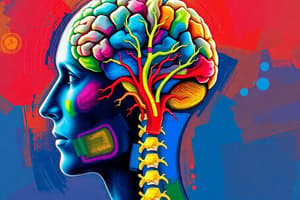Podcast
Questions and Answers
What are the two main components of the peripheral nervous system?
What are the two main components of the peripheral nervous system?
- Brain and spinal cord
- Somatic and autonomic nervous systems (correct)
- Cranial and spinal nerves
- Central and peripheral nervous systems
Which of the following functions is primarily associated with the sympathetic nervous system?
Which of the following functions is primarily associated with the sympathetic nervous system?
- Regulation of digestion
- Control of everyday bodily functions
- Relaxation of the body
- Arousal and fight-or-flight response (correct)
Which cranial nerve is responsible for controlling vision?
Which cranial nerve is responsible for controlling vision?
- Oculomotor nerve
- Optic nerve (correct)
- Trigeminal nerve
- Trochlear nerve
What is the role of the olfactory nerve?
What is the role of the olfactory nerve?
How many pairs of cranial nerves are there?
How many pairs of cranial nerves are there?
Which system is involved in interactions with the external environment?
Which system is involved in interactions with the external environment?
Which spinal nerves innervate the lower back and front of the legs?
Which spinal nerves innervate the lower back and front of the legs?
What do sensory dermatomes represent?
What do sensory dermatomes represent?
What is the primary function of the dorsal root of the spinal cord?
What is the primary function of the dorsal root of the spinal cord?
Which neurons are primarily responsible for motor commands in the spinal cord?
Which neurons are primarily responsible for motor commands in the spinal cord?
What role does the central canal play in the spinal cord?
What role does the central canal play in the spinal cord?
Which of the following structures is NOT a part of the forebrain?
Which of the following structures is NOT a part of the forebrain?
What is the thickness of the cerebral cortex on average?
What is the thickness of the cerebral cortex on average?
Which layer of the neocortex primarily consists of axons and dendrites with few cell bodies?
Which layer of the neocortex primarily consists of axons and dendrites with few cell bodies?
What distinguishes the ventral root of the spinal cord from the dorsal root?
What distinguishes the ventral root of the spinal cord from the dorsal root?
Which staining technique is used to visualize layers in the neocortex?
Which staining technique is used to visualize layers in the neocortex?
Flashcards are hidden until you start studying
Study Notes
Nervous System
- The nervous system is divided into two parts: the central nervous system (CNS) and the peripheral nervous system (PNS).
- The CNS includes the brain and spinal cord.
- The PNS includes the somatic and autonomic nervous systems.
- The somatic nervous system interacts with the external environment.
- The autonomic nervous system regulates the body’s internal environment.
- The autonomic nervous system is further divided into the sympathetic nervous system (arousal) and the parasympathetic nervous system (relax).
Spinal Cord
- The spinal cord is a long, thin, tubular bundle of nerve tissue that extends from the brain to the coccyx.
- There are 31 pairs of spinal nerves.
- Spinal nerves connect through the spinal cord.
- Cranial nerves: connect directly to the brain.
- There are twelve cranial nerves that are primarily considered part of the peripheral nervous system, with the exception of the optic nerve which is part of the CNS.
- Cervical nerves (C1-C8) supply the neck, shoulders and arms.
- Thoracic nerves (T1-T12) supply the chest, upper back, and abdomen.
- Lumbar nerves (L1-L5) innervate the lower back, hip, and front of the legs.
- Sacral nerves (S1-S5) supply the pelvic region, buttocks, and back of the legs.
- Coccygeal nerves connect to the coccyx or tailbone.
- Sensory dermatomes represent areas of the skin supplied by specific spinal nerves.
- The spinal cord runs from the base of the brain to the coccyx, with nerves exiting above or below the vertebrae based on their positioning.
Spinal Cord: Cross Section
- Unipolar sensory neurons carry sensory information from the body to the spinal cord, entering through the dorsal root.
- The dorsal horn receives sensory input.
- Multipolar motor neurons carry motor commands, exiting through the ventral root.
- The ventral horn contains motor neurons.
- The central canal runs through the center of the spinal cord, carrying cerebrospinal fluid.
- The spinal cord processes sensory and motor information.
Brain
- The brain is the control center of the nervous system.
- It is divided into the forebrain, midbrain, and hindbrain.
- The forebrain includes the telencephalon (outer layer is the cerebral cortex) and the diencephalon (thalamus and hypothalamus).
- The midbrain is also known as the Mesencephalon.
- The hindbrain includes the Metencephalon and the Myelencephalon.
Cerebral Cortex
- The cerebral cortex is part of the telencephalon and it is made up of six layers.
- These layers can be visualized using Golgi staining and Nissl staining.
- The six layers include:
- Layer 1: Molecular layer: mostly axons and dendrites with few cell bodies.
- Layer 2: External granular layer: densely populated with small neurons.
- Layer 3: External pyramidal layer: contains larger neurons.
- Layer 4: Internal granular layer: receives sensory input from the thalamus.
- Layer 5: Internal pyramidal layer: sends output to other brain regions and spinal cord.
- Layer 6: Multiform layer: sends output to the thalamus.
Studying That Suits You
Use AI to generate personalized quizzes and flashcards to suit your learning preferences.




